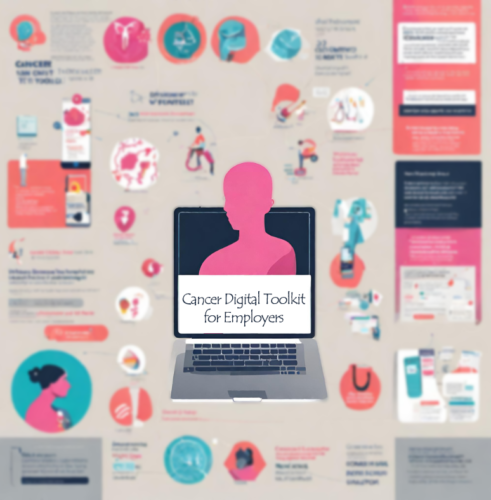
Summary
Every year, almost 15,000 working-age people in Denmark are diagnosed with cancer.1 Three in four people experience challenges returning to work, and one in three say managers are ill-equipped to handle employees being diagnosed with cancer.2 The Danish Cancer Society launched Taghåndom.dk,2 an online toolkit that holds resources for employers and managers to help support their employees who have cancer. Since its launch, the toolbox has 300 monthly users, 90% of which say the information provided was useful.3
Challenge
Every year in Denmark, almost 15,000 people of working age (15–64 years) are diagnosed with cancer; this number is predicted to continue to rise.1 Cancer survival rates are also increasing,4 which means that more people are working while, and after, living with cancer.
Maintaining employment after cancer treatment has been shown to improve quality of life. However, 75% of working-age people with cancer in Denmark say they experienced challenges returning to work, with 25% losing their employment entirely, resulting in economic hardship and a poorer quality of life.25 One in three people who remained in employment say that their employer was ill-equipped to handle employees being diagnosed with cancer.2
Solution
In 2019, The Danish Cancer Society launched Taghåndom.dk,2 an online campaign and toolkit that provides resources for employers and managers to help support employees with cancer in the workplace. It was developed based on a variety of workshops hosted with managers and human resource professionals from over 200 cross-industry companies.3 Key themes were identified and these were verified by the Confederation of Danish Industry and the Central Organisation of Industrial Employees in Denmark3.
The six overarching themes identified were:3
- The first conversations between the employer or manager and the employee about cancer.
- Aligning expectations for communication.
- Adjustments of work demands and tasks.
- Development of policies and procedures.
- Information about professional counselling.
- Learning about cancer.
The toolkit contains a variety of templates, guidance and advice based on these themes.
What has been achieved?
Since January 2023, the toolkit has 300 monthly users6 and 90% of users report finding the information provided useful.3
The toolkit was also a finalist for the Union for International Cancer Control’s ‘best advocacy with impact report’ award.7 The Danish Cancer Society was commended for outstanding work in developing and implementing impactful advocacy programmes.
Next steps
An online survey is being sent to employers to investigate their knowledge about the physical and psychological side effects of cancer treatment.6 This information will then be used to update the toolkit, ensuring knowledge gaps are met.
The toolkit will also be promoted via the press and social media. The goal is to raise awareness about the toolkit and to forge new collaborations that can make it more impactful. The toolkit is one part of a larger effort by the Danish Cancer Society to improve the integration of people with cancer into the workplace across Denmark.6
References:
- International Agency for Research on Cancer. 2020. Estimated number of new cases from 2020 to 2025, Both sexes, age [15-64]: All cancers, Denmark [Accessed 19/07/2023] Available here: https://gco.iarc.fr/tomorrow/en/dataviz/bars?years=2025&single_unit=1000&types=0&populations=208&group_populations=1&multiple_populations=1&age_start=3&age_end=12&key=total&show_bar_mode_prop=1
- Danish Cancer Society. About the campaign. [Accessed 19/07/2023] Available here: https://www.cancer.dk/taghaandom/om-kampagnen/
- Brunn DM. Supporting employers in handling cancer at the workplace: Development of a digital toolkit. World Cancer Congress; October 2022; Geneva, Switzerland
- International Agency for Research on Cancer. 2020. 5-year age-standardised relative survival (%), Males and Females: All sites, Denmark. [Accessed 19/07/2023] Available here: https://nordcan.iarc.fr/en/dataviz/survival?cancers=980&set_scale=0&populations=208&sexes=1_2
- Ross L, Petersen MA, Johnsen AT, et al. 2012. Factors associated with Danish cancer patients' return to work. A report from the population-based study 'The Cancer Patient's World'. Cancer Epidemiol 36(2): 222-9
- 6. Opperman D. 2023. Personal communication by email: 10/08/2023
- World Cancer Congress. 2022. Awards. Available here: https://www.worldcancercongress.org/programme/awards